Justin Conrad’s path into international security was shaped by a deep curiosity of world affairs and a commitment to understanding conflict.
“I’ve always been fascinated by how the world works — how different cultures, politics and histories intertwine,” Conrad said.
Conrad, the Gary K. Bertsch Director of the Center for International Trade and Security (CITS) and professor of international affairs at UGA, began his academic journey at Florida State University, followed by a master’s degree from UCLA. Immediately out of graduate school, Conrad gained professional experience working at a public affairs firm and spending significant time in Latin America, specifically Colombia. It was there, witnessing firsthand the devastating effects of violence, that he developed a strong desire to systematically understand and prevent terrorism.
This mission eventually led him back to FSU, where he earned his Ph.D. in political science. During and after this period, Conrad served as a commissioned officer in the U.S. Navy Reserve, a role that continues to shape his research today. His intelligence work paired with his education allows him to bring a unique dual perspective — one rooted in academia, the other in real-world practice — that enhances both his scholarship and his contributions to national security.
“I realized early on that to truly understand conflict, you have to see it from different perspectives. That’s why I spent time in the field, and that’s why I’m committed to blending theory and practice in everything I do,” Conrad said.
Leading the Center for International Trade and Security
Since joining the University of Georgia in 2019, Conrad has led CITS with a mission to address global security challenges. Under his direction, CITS has become a vital hub for applied research, bridging the gap between academic knowledge and practical security issues.
“At CITS, we’re not just thinking about the future of security — we’re actively shaping it,” he said.
Conrad sees his role as twofold: building interdisciplinary teams of experts to tackle global problems and educating the next generation of leaders.
“I truly believe that one of the most critical tasks we have is developing the leaders who will face tomorrow’s security challenges. That means building bridges between different fields and perspectives — whether it’s nuclear security, cyber threats or energy policy,” Conrad said.
To this end, CITS partners with departments across UGA, such as engineering, computer science and public health, on large-scale projects funded by federal agencies and private foundations.
Training future national security leaders
A cornerstone of CITS is its commitment to student education and leadership development. Conrad places a strong emphasis on providing real-world experiences to students through a variety of specialized programs.
The Richard B. Russell Security Leadership Program trains top undergraduate students to become future leaders in national security, providing them with the skills and experiences necessary to excel in a rapidly evolving field. In addition, the Master of International Policy program offers students the opportunity to focus on security-related fields, equipping them with the expertise needed to navigate complex global challenges.

“Our students aren’t just learning about security — they’re out there making a difference. They’re working on projects that matter, and that hands-on experience gives them the tools they need to succeed,” Conrad said.
These programs are designed to give students both the academic foundation and practical exposure they need to succeed in national and international security roles.
In addition to research and classroom experience, CITS offers experiential learning opportunities that take students to places like Washington, D.C., nuclear facilities like Plant Vogtle, and national laboratories such as Oak Ridge and Savannah River.
“These experiences are game-changers for our students,” Conrad said. “They get to see the practical side of security, which gives them a huge advantage when they enter the job market.”
Research and teaching — merging theory with practice
Conrad’s research spans a broad array of security issues, and he thrives on the diversity of projects at CITS. One recent study, conducted with a former MIP student with a background in genetics, explored how personal experiences with COVID-19 shaped perceptions of biological threats and security policies.
“This kind of interdisciplinary work is essential in today’s world, where security issues are complex and multifaceted,” Conrad said. “We need fresh perspectives to tackle these problems.”
In the classroom, Conrad brings his field experience to life for his students. He teaches courses on counterterrorism and nuclear regulations, the latter inspired by his joint appointment with the Savannah River National Laboratory.
“My students get to explore the intersection of theory and practice. They understand what the research says and how it plays out in real-world situations,” Conrad said.
The future of CITS and security education at UGA
Looking ahead, Conrad envisions continued growth for CITS, both in research and in educational opportunities for students.
“We’re constantly pushing the boundaries of what we know about security,” he said. “As long as we stay curious and open to new ideas, CITS will remain a leader in this field.”
For Conrad, leading CITS at UGA is the realization of a dream.
“When I was in graduate school, UGA was one of the places I hoped to work one day,” he said. “Fifteen years later, I’m living that dream. It’s been everything I expected and more — and it’s an honor to be part of a university that’s making such a significant impact in the world of security.”
Effective Aug. 1, Conrad will assume the role of department head for the Department of International Affairs in SPIA.


